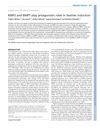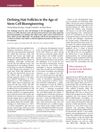 113 citations,
November 2017 in “Scientific Reports”
113 citations,
November 2017 in “Scientific Reports” Tiny particles from stem cells help activate hair growth cells and encourage hair growth in mice without being toxic.
 112 citations,
January 2014 in “Molecular and cellular therapies”
112 citations,
January 2014 in “Molecular and cellular therapies” Blocking the Wnt pathway could lead to new treatments for cancer and tissue repair but requires careful development to avoid side effects.
 110 citations,
July 2017 in “Immunology”
110 citations,
July 2017 in “Immunology” Skin's Regulatory T cells are crucial for maintaining skin health and could be targeted to treat immune-related skin diseases and cancer.
 95 citations,
January 2004 in “Archives of Dermatological Research”
95 citations,
January 2004 in “Archives of Dermatological Research” Peripilar signs can help diagnose androgenetic alopecia and reveal its cause.
 94 citations,
June 2016 in “The FASEB Journal”
94 citations,
June 2016 in “The FASEB Journal” The Wnt/β-catenin pathway helps tissue regeneration but can also cause fibrosis, and drugs that inhibit this pathway may aid in healing skin and heart tissues.
 88 citations,
August 2008 in “Development”
88 citations,
August 2008 in “Development” BMP2 and BMP7 have opposite roles in feather formation.
 75 citations,
June 2019 in “International Journal of Molecular Sciences”
75 citations,
June 2019 in “International Journal of Molecular Sciences” Costunolide may have multiple health benefits, including promoting hair growth and protecting against cancer and diabetes, but more research is needed.
 75 citations,
October 2016 in “Genes & Development”
75 citations,
October 2016 in “Genes & Development” Cells in hair follicles help create fat cells in the skin by releasing a protein called Sonic Hedgehog.
 74 citations,
September 2006 in “Cell Cycle”
74 citations,
September 2006 in “Cell Cycle” The HR protein's role as a repressor is essential for controlling hair growth.
 71 citations,
November 2013 in “Clinics in Dermatology”
71 citations,
November 2013 in “Clinics in Dermatology” Acne is a chronic disease linked to various systemic conditions and has significant psychological and social effects.
 66 citations,
July 2015 in “Journal of Molecular Biology”
66 citations,
July 2015 in “Journal of Molecular Biology” The document concludes that for hair and feather growth, it's better to target the environment around stem cells than the cells themselves.
 61 citations,
January 2017 in “Human Reproduction Open”
61 citations,
January 2017 in “Human Reproduction Open” The review recommends hormone replacement therapy for women with premature ovarian insufficiency to manage symptoms and protect health, with specific approaches for different groups.
 61 citations,
January 2015 in “Hormones”
61 citations,
January 2015 in “Hormones” Liraglutide caused significant weight loss in some obese women with PCOS, especially those with severe obesity and insulin resistance.
 60 citations,
July 2020 in “ACS Nano”
60 citations,
July 2020 in “ACS Nano” Using CRISPR for gene editing in the body is promising but needs better delivery methods to be more efficient and specific.
 60 citations,
August 2008 in “Human molecular genetics online/Human molecular genetics”
60 citations,
August 2008 in “Human molecular genetics online/Human molecular genetics” A position effect on the TRPS1 gene causes excessive hair growth in humans and mice.
 59 citations,
February 2012 in “Journal of Dermatological Science”
59 citations,
February 2012 in “Journal of Dermatological Science” Environmental factors at different levels control hair stem cell activity, which could lead to new hair growth and alopecia treatments.
 59 citations,
November 2010 in “Circulation Research”
59 citations,
November 2010 in “Circulation Research” Wnt signaling may be linked to heart diseases in aging and could be a target for future treatments.
 59 citations,
March 2008 in “The journal of investigative dermatology/Journal of investigative dermatology”
59 citations,
March 2008 in “The journal of investigative dermatology/Journal of investigative dermatology” Smad-4 and Smad-7 are key in hair follicle development, with other Smads being less important.
 57 citations,
July 2005 in “Clinics in Plastic Surgery”
57 citations,
July 2005 in “Clinics in Plastic Surgery” Reconstruct lips with proper planning, templates, and revisions for appearance and function.
 56 citations,
December 2011 in “Steroids”
56 citations,
December 2011 in “Steroids” The document suggests treating individuals with nonclassic congenital adrenal hyperplasia who show symptoms, especially those related to excess male hormones.
 56 citations,
February 2006 in “American journal of physiology. Cell physiology”
56 citations,
February 2006 in “American journal of physiology. Cell physiology” Steroid sex hormones activate matriptase in prostate cancer cells but not in breast cancer cells.
 54 citations,
November 2017 in “Scientific Reports”
54 citations,
November 2017 in “Scientific Reports” The study found that certain microRNAs are higher in the cells and lower in the fluid of women with a specific type of polycystic ovary syndrome, and one microRNA could potentially help diagnose the condition.
 52 citations,
May 2013 in “Supportive Care in Cancer”
52 citations,
May 2013 in “Supportive Care in Cancer” Scalp cooling significantly reduces hair loss in chemotherapy patients.
 50 citations,
September 2011 in “Biochimica et Biophysica Acta (BBA) - Molecular and Cell Biology of Lipids”
50 citations,
September 2011 in “Biochimica et Biophysica Acta (BBA) - Molecular and Cell Biology of Lipids” Maintaining the right amount of retinoic acid is crucial for healthy hair and skin.
 49 citations,
July 2009 in “Fitoterapia”
49 citations,
July 2009 in “Fitoterapia” Essential oils from Chamaecyparis obtusa may help hair grow by increasing a growth-related gene.
 49 citations,
September 2007 in “Journal of Investigative Dermatology”
49 citations,
September 2007 in “Journal of Investigative Dermatology” The study found that bioengineered hair follicles work when using cells from the same species but have issues when combining human and mouse cells.
 46 citations,
December 2010 in “The journal of investigative dermatology/Journal of investigative dermatology”
46 citations,
December 2010 in “The journal of investigative dermatology/Journal of investigative dermatology” Disrupting Acvr1b in mice causes severe hair loss and thicker skin.
 46 citations,
December 2001 in “Journal of Endocrinology/Journal of endocrinology”
46 citations,
December 2001 in “Journal of Endocrinology/Journal of endocrinology” FLRG and follistatin have different roles in wound healing.
 42 citations,
January 2011 in “Journal of Biomedical Optics”
42 citations,
January 2011 in “Journal of Biomedical Optics” Infrared and Raman imaging can non-destructively analyze hair structure and help diagnose hair conditions.
 40 citations,
December 2006 in “Journal of The European Academy of Dermatology and Venereology”
40 citations,
December 2006 in “Journal of The European Academy of Dermatology and Venereology” Minoxidil helps hair regrowth in traction alopecia.





























